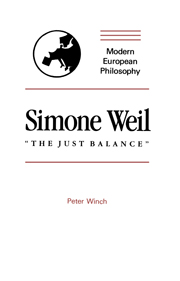Book contents
- Frontmatter
- Contents
- Acknowledgements
- 1 Introduction
- 2 The Cartesian background
- 3 The sensations of the present moment
- 4 “La simple perception de la nature est une sorte de danse”
- 5 Language
- 6 Necessity
- 7 Equilibrium
- 8 “Completely free action”
- 9 The power to refuse
- 10 “The void”
- 11 Geometry
- 12 Incommensurability
- 13 Beauty
- 14 Justice
- 15 “A supernatural virtue”?
- Notes
- Bibliography
- Index
2 - The Cartesian background
Published online by Cambridge University Press: 05 February 2010
- Frontmatter
- Contents
- Acknowledgements
- 1 Introduction
- 2 The Cartesian background
- 3 The sensations of the present moment
- 4 “La simple perception de la nature est une sorte de danse”
- 5 Language
- 6 Necessity
- 7 Equilibrium
- 8 “Completely free action”
- 9 The power to refuse
- 10 “The void”
- 11 Geometry
- 12 Incommensurability
- 13 Beauty
- 14 Justice
- 15 “A supernatural virtue”?
- Notes
- Bibliography
- Index
Summary
Simone Weil is best known for her remarkable life, her striking religious insights, and certain aspects of her social and political thought. Philosophers generally have taken comparatively little interest in her work; this is especially, though not exclusively, true of the Anglo-Saxon academic philosophical world. Of course her philosophical thinking cannot, without a quite unacceptable degree of distortion, be prized apart from the rest of her work. There are deep difficulties at many points even in knowing where to draw the line, or whether a line can be drawn at all, between what should be treated as belonging to philosophy and what to, say, religious meditation. There are difficulties even in being sure one understands what one is asking in trying to raise such a question. These difficulties themselves often raise issues of deep philosophical interest, issues which we should lose sight of were we simply to drop the distinction between discussions which are properly speaking philosophical in character and those which are not. I shall raise such issues from time to time in the course of the present work, and more especially in my concluding chapter.
Simone Weil was trained as a philosopher: at the Lycée Henri IV in Paris and at the École Normale Supérieure. The teacher who most influenced her was the philosopher Alain (nom de plume of Émile Chartier). She wrote an interesting student dissertation, “Science et perception dans Descartes.”
- Type
- Chapter
- Information
- Simone Weil: "The Just Balance" , pp. 5 - 17Publisher: Cambridge University PressPrint publication year: 1989

